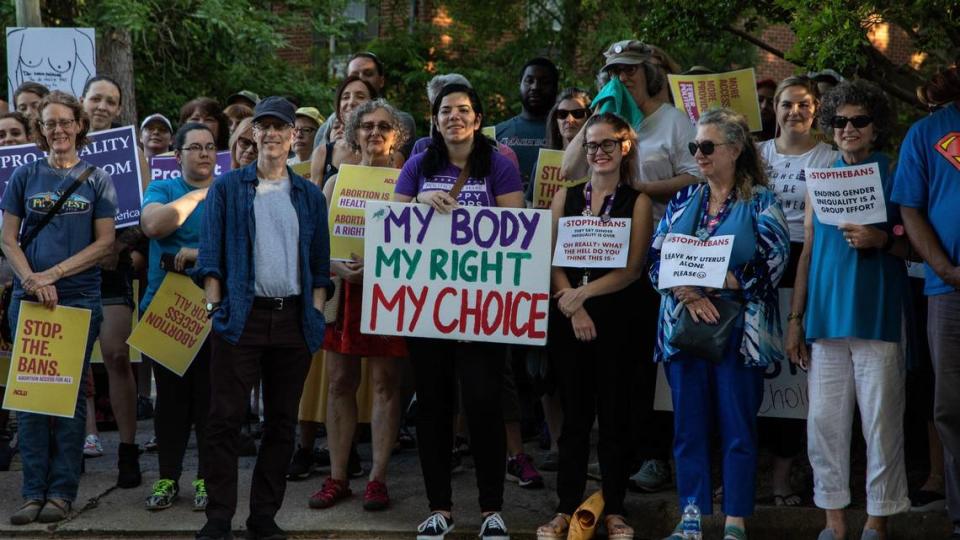Abortion ban after 12 weeks to move forward in NC legislature after GOP reaches deal
Republican state lawmakers said Tuesday that they have reached a consensus after months of negotiations and will unveil a 12-week abortion ban, with exceptions, this week.
The agreement between the House and Senate’s GOP leaders on banning abortion after the first trimester, or after the first 12 weeks of pregnancy, comes after months of internal talks among Republicans over what kind of new restrictions all members of the party could get behind and vote for.
Many Republicans had been split between a first-trimester ban of the kind that lawmakers ultimately settled on, and a more restrictive six-week ban supported by the more conservative wing of the party.
With Republicans coming to an agreement, North Carolina could be weeks, if not days, away from enacting new abortion restrictions.
Abortions are currently banned after 20 weeks of pregnancy, with an exception for medical emergencies. The 20-week ban had been blocked by a federal judge, but was reinstated in August following the U.S. Supreme Court’s decision overturning Roe v. Wade. Prior to that, abortions were allowed up until the point of fetal viability — generally around 23 or 24 weeks.
In order to pass new restrictions into law, Republicans would need to override an almost certain veto from Democratic Gov. Roy Cooper. Republicans were previously one seat short of being able to do that, but after Rep. Tricia Cotham switched parties and joined the GOP last month, they have the votes to do so all on their own.
That doesn’t necessarily mean the eventual votes in the House and Senate will fall exactly along party lines, since a small group of Democrats in the House have shown a willingness to vote with Republicans on key bills this session.
Asked about upcoming abortion legislation, Cooper told reporters after the Council of State meeting on May 2 that he has “concerns about restricting women’s reproductive freedom. We’ve heard all kinds of things. We don’t know what’s going to happen.”

Abortion landscape in North Carolina
In North Carolina, the vast majority of abortions are performed before the 12-week mark. About 7% of abortions were performed after that point in 2020, according to the most recent data posted by the N.C. Department of Health and Human Services.

Doctors and abortion-rights advocates worry the ban would have dire consequences for that small and often vulnerable group of patients.
That 7% often encompasses people who delay the procedure as they struggle to find or afford health care, said Dr. Beverly Gray, an OB-GYN at Duke Health. It includes teenagers who wait to tell their parents they’re pregnant. After the Supreme Court’s decision, with strict abortion bans in large swaths of the South, many more women face delays in finding an appointment at an out-of-state clinic, potentially pushing the abortion later in their pregnancy.
“You could be already 10 weeks pregnant when you realize you are pregnant,” Rivera said. “Then, if you live in Florida, you’ve got to figure out a way to get to Chapel Hill — and that’s if there’s even an appointment available to you.”
North Carolina has become an abortion destination for Southern women. In the months after Roe v. Wade was overturned, the number of abortions provided in the state shot up by 37%. As a result, North Carolina’s abortion clinics have, at some points, had a four-week waiting list for appointments.
“North Carolina became the one place where many women throughout the Southeast could come,” Democratic Sen. Val Applewhite said.
“So this does not just affect North Carolina,” said Applewhite, of Cumberland County. “It affects surrounding states as well, as more restrictions are put in place. So this is a big deal. Not just for us.”
A 12-week-ban could also affect women with a wanted pregnancy, who can receive news at a second-trimester ultrasound appointment that their fetus has a condition that prevents it from surviving outside the womb, Gray said.
“If they learned that their wanted pregnancy is not going to survive, they should be able to have the option to end that pregnancy,” Rivera said.
North Carolina Senate Minority Leader Dan Blue, a Raleigh Democrat, said just before the announcement that he and most Senate Democrats want to codify Roe v. Wade.
If lawmakers left the decision to get an abortion “up to a woman and her doctor, that would be very satisfactory with me rather than all of these conditions, with mostly men telling women what to do on health issues,” he said.

